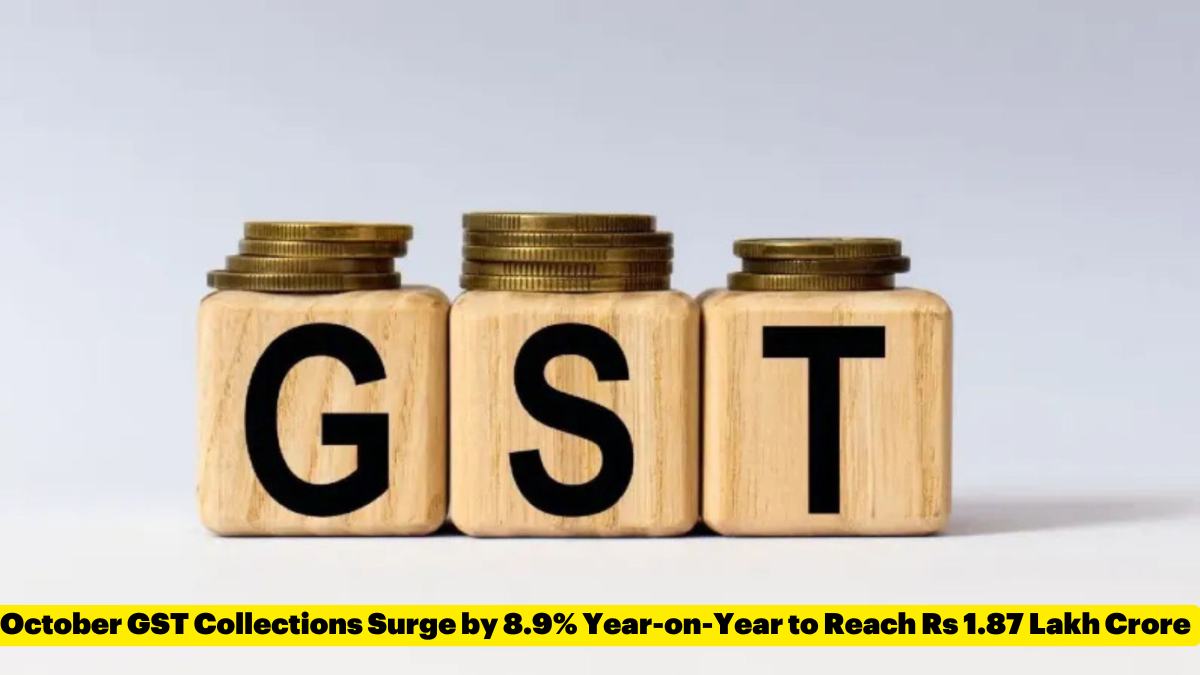Gross Goods and Services Tax (GST) collections in October reached Rs 1.87 lakh crore, marking an 8.9% increase year-on-year. This robust collection, based on September sales, represents the second-highest level of monthly GST collections since the indirect tax regime’s inception in July 2017. The rise is primarily attributed to stronger domestic transactions, with revenue from imports experiencing slower growth, as detailed by the Ministry of Finance in data released on Friday.
Background: Recovering from a Slow Growth Phase
After a three-year low growth rate in September, October saw an encouraging rebound in gross GST collections. Despite this improvement, the growth rate has not yet returned to the double-digit levels recorded in previous years. The highest GST collection on record was achieved in April 2024, when GST collections peaked at Rs 2.10 lakh crore.
Growth in Domestic GST Collections Outpaces Imports
The primary driver behind October’s GST growth was the surge in domestic transactions rather than imports. October saw domestic GST revenue grow by 10.6% year-on-year, a notable improvement from the 5.9% growth rate in September. In contrast, GST revenue from imports rose by a more modest 3.9% in October, down from an 8% rise in September. On a net basis, the increase in domestic GST revenue was 8.7%, significantly higher than the 4.5% growth seen in the previous month, while import-related GST revenue grew by 5.4%.
Detailed Breakdown of GST Components
- Central GST (CGST): The CGST collections — the tax levied on intra-state supplies by the Centre — amounted to Rs 33,821 crore in October.
- State GST (SGST): The SGST collections, levied on intra-state supplies by states, totaled Rs 41,864 crore for the month.
- Integrated GST (IGST): IGST, applicable on all inter-state supplies of goods and services, accounted for Rs 99,111 crore.
- Cess Collections: The cess — levied on certain goods for compensation to states — contributed Rs 12,550 crore to the October GST collections.
State-Wise Performance in GST Collections
Out of 38 states and union territories (including the Centre’s jurisdiction), 14 states/UTs exceeded the national average growth rate of 10.6% in GST collections. Maharashtra led the states in absolute GST collection, reporting Rs 31,030 crore at a 14% growth rate, followed by Karnataka (Rs 13,081 crore, 9% growth), Gujarat (Rs 11,407 crore, 17% growth), Tamil Nadu (Rs 11,188 crore, 4% growth), and Haryana (Rs 10,045 crore, 15% growth).
However, not all states recorded growth in GST collections. A few northeastern states, along with Himachal Pradesh and Chhattisgarh, saw contractions in GST collections:
- Arunachal Pradesh: -33%
- Nagaland: -8%
- Manipur: -5%
- Himachal Pradesh: -2%
- Chhattisgarh: -1%
GST Refund Rate and Growth Outlook
One notable element of the October GST data is the domestic refund rate, which stood at 42.8%. This high refund rate has implications for the net revenue collected, as refunds effectively reduce the gross collections that are available for public expenditure. Despite the increased refund rate, the GST collection growth rate was robust, underscoring the resilience of domestic economic activity.
While the gross GST growth rate showed signs of recovery, it remained lower than the double-digit growth rates seen in the past two fiscal years. The slower rate of GST growth from imports signals a broader trend in shifting consumption patterns, with domestic sales outpacing those from imports.




 Which River is known as the Black River?...
Which River is known as the Black River?...
 Which State is the Largest Producer of C...
Which State is the Largest Producer of C...
 PNB Announces ‘PNB Soldierathon 2026’ Ah...
PNB Announces ‘PNB Soldierathon 2026’ Ah...








